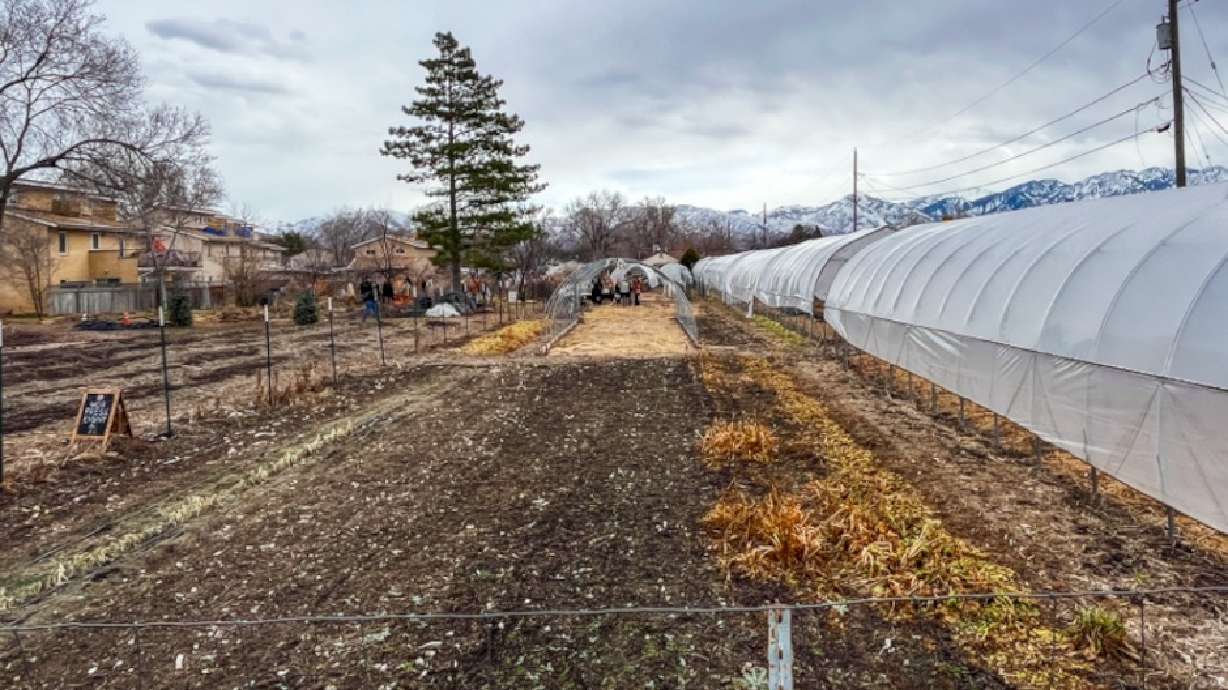Estimated read time: 4-5 minutes
This archived news story is available only for your personal, non-commercial use. Information in the story may be outdated or superseded by additional information. Reading or replaying the story in its archived form does not constitute a republication of the story.
SALT LAKE CITY — The importance of local farming, including in urban areas, reached a critical point during the COVID-19 pandemic.
Grocery stores strapped for produce started reaching out to organizations like the Wasatch Community Gardens asking for help as they sought to keep shelves full of fruits and vegetables amid shortages, said Georgina Griffith-Yates, the nonprofit's executive director. To her, that meant there just wasn't enough food being grown within the region that residents had access to.
"That was really eye-opening to us, to see the importance of keeping food local and growing food local — not just on a backyard scale but on a larger scale to donate to others who can't grow their own food," she told KSL.com, recalling those conversations.
But Wasatch Community Gardens had its own problems that threatened the future of its operations. It relied on leases over the past eight years to operate a 1.4-acre farm near The Gateway, land that's slated for new development in the growing city.
That is no longer the case.
Griffith-Yates and other organization leaders gathered Tuesday to celebrate Wasatch Community Gardens' first "forever home" on the banks of the Surplus Canal in Salt Lake City's Glendale neighborhood. It acquired a 2-acre property through a partnership with Utah Open Lands, which placed a conservation easement to prevent the land from being uprooted for redevelopment ever again.
"Being able to say that we can protect this land and continue to grow food on it and not be at risk for development is important for us," she said.

The land in question is located by a row of neighborhood homes, leased by a Community Supported Agriculture farmer growing produce and flowers for shareholders. The farmer will continue operations as normal this year before Wasatch Community Gardens takes over in 2025, switching operations to primarily vegetables and herbs that will be donated through social service sectors, including shelters.
It's also the latest project carried out by Utah Open Lands, a nonprofit that has purchased land all over the state in recent years and placed conservation easements to protect them. It's perhaps best known for protecting places like Bonanza Flat and Bridal Veil Falls, but a "majority" of its 64,000 acres of projects have saved land used by farmers and ranchers, said Wendy Fisher, the group's executive director.
In this case, the organization eyed farmland in what it views as a thriving "agrihood," areas where communities implement agriculture within residential space. Its goal is to preserve historic farmland as it disappears across the Wasatch Front to make room for new housing. She said the deal was "a long time coming" because it took years for all the parts to come together.
It won't just provide produce for people in need when operations begin in earnest next year, either.
Project leaders — and others involved in helping out — say they hope to hold educational classes on the farm, which can educate urban residents about where their food comes from, spark people to become new farmers and help current farmers and growers learn new practices to grow more produce with less water, among other things.
We hope to see more projects like this throughout the state (and) throughout the country, and we would love to be able to partner and guide through the process because ... the rewards and the outcome for the community are definitely worth it.
– Georgina Griffith-Yates, Wasatch Community Gardens executive director
Sen. Luz Escamilla, D-Salt Lake City, also the co-chairwoman of Utah's Local Food Advisory Council, pointed out that only about 3% of the vegetables Utahns consume are grown in the state.
"If we have another situation like the pandemic ... I'm not sure if we can make it," she said. "This is one of those places that's going to be training, educating (and) fostering — especially our youth and kiddos — an understanding of the value of growing your own food."

Planning for the farm's future is also just getting started. Escamilla is requesting $295,000 from the Utah Legislature this year to help the new Wasatch Community Gardens farm grow and launch job training and community engagement programs. The funds would be used for new infrastructure to help "build it up," Griffith-Yates said.
The plan is to craft a "shareable model" that she said could be used by like-minded organizations seeking similar projects not just along the Wasatch Front.
"We want to be able to share our best practices with any community that wants to do something like this," Yates said, as she stood on the farmland. "We hope to see more projects like this throughout the state (and) throughout the country, and we would love to be able to partner and guide through the process because ... the rewards and the outcome for the community are definitely worth it."









